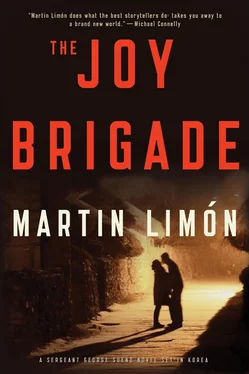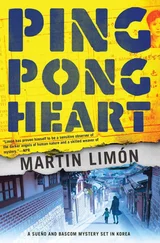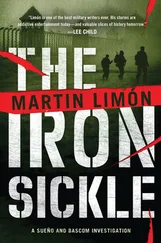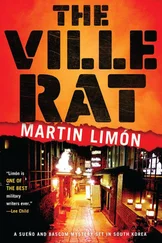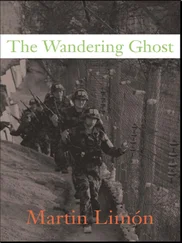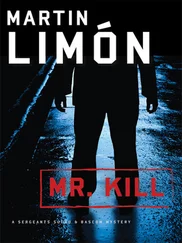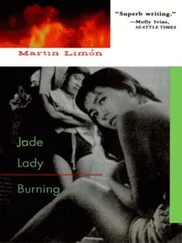Martin Limon - Joy Brigade
Здесь есть возможность читать онлайн «Martin Limon - Joy Brigade» весь текст электронной книги совершенно бесплатно (целиком полную версию без сокращений). В некоторых случаях можно слушать аудио, скачать через торрент в формате fb2 и присутствует краткое содержание. Жанр: Полицейский детектив, на английском языке. Описание произведения, (предисловие) а так же отзывы посетителей доступны на портале библиотеки ЛибКат.
- Название:Joy Brigade
- Автор:
- Жанр:
- Год:неизвестен
- ISBN:нет данных
- Рейтинг книги:5 / 5. Голосов: 1
-
Избранное:Добавить в избранное
- Отзывы:
-
Ваша оценка:
- 100
- 1
- 2
- 3
- 4
- 5
Joy Brigade: краткое содержание, описание и аннотация
Предлагаем к чтению аннотацию, описание, краткое содержание или предисловие (зависит от того, что написал сам автор книги «Joy Brigade»). Если вы не нашли необходимую информацию о книге — напишите в комментариях, мы постараемся отыскать её.
Joy Brigade — читать онлайн бесплатно полную книгу (весь текст) целиком
Ниже представлен текст книги, разбитый по страницам. Система сохранения места последней прочитанной страницы, позволяет с удобством читать онлайн бесплатно книгу «Joy Brigade», без необходимости каждый раз заново искать на чём Вы остановились. Поставьте закладку, и сможете в любой момент перейти на страницу, на которой закончили чтение.
Интервал:
Закладка:
Martin Limon
Joy Brigade
1
Yellow floodlights loomed out of thick fog. Atop the rickety wooden dock, soldiers paced.
“Red-star jokers,” Mergim told me, squinting into the mist-laden night. “They inspect ship. After that everything okay. Maybe.”
I leaned on a taut steel cable, gripping it tightly. The sea rumbled below: dark, listless, reeking of slimy death. We were five miles inside the Taedong River estuary in the Democratic People’s Republic of Korea, or DPRK, better known as North Korea.
Mergim scratched his unshaven face, searching my eyes for signs of panic. Apparently, he found them. “Don’t worry,” he said, slapping me on the back. “I come here many times. Still alive.” As if to demonstrate, he pinched the loose skin on the back of his hand. “You be okay.” Then he turned back to the dock. “Maybe.”
My name is George Sueno. I’m an agent for the Eighth United States Army Criminal Investigation Division in Seoul, South Korea. But now I was standing on the deck of an Albanian merchant freighter, a ship called the Star of Tirana. I was clad in unwashed woolen work pants, staring into the vast predawn darkness of communist North Korea, wondering if this entire operation had already been exposed and, more importantly, if I’d be tortured to death by those pacing red devils.
Mergim had briefed me on what would happen once we docked, and he was telling me again in an attempt to calm me. It wasn’t working. My fear of North Koreans, “the enemy,” ran too deep.
Concerned, Mergim reached into his dirty wool jacket and pulled out a green vial. He popped the cap. Grease-stained fingers held up a blue pill. “You want?”
I shook my head. If I were to survive, I would need my wits about me. I turned and stared at the dock, and the demons pacing upon it, willing myself to be calm. When a foghorn sounded, I nearly leapt off the edge of the boat.
“You okay?” Mergim asked, eyeing me.
“Okay,” I said. The deck of the old merchant ship rolled slightly, or at least I thought it did.
“I go work,” Mergim said. “You stay.” He patted me on the shoulder. “Take deep breath. Don’t think too much.”
He turned and his soggy leather boots pounded down the iron-planked walkway.
When he was gone, I reached inside my crinkled canvas peacoat, making sure that my phony Peruvian passport was still folded into my inner pocket. I breathed deeply, willing myself toward calmness. The tart aroma of garlic wafted on the air. This country was definitely Korea, but a different Korea than I’d known.
My job here was clear. Once we were on dry land in this port city known as Nampo, I had to somehow make my way to the Nampo Southern Section People’s Grain Warehouse. From weeks of studying aerial surveillance, I knew exactly where it was. The problem would be managing to evade our North Korean minders and slip away unseen from the area set aside for foreign merchant marines. Once I reached the grain warehouse-if I ever did-I’d be escorted elsewhere by a contact who would be waiting for me, a former soldier who went by the name of Hero Kang. That’s all I knew about him. That and a password. If he betrayed me-or if Mergim betrayed me-I’d be lost in a world of pain. The North Koreans had tortured Americans before, most notably the crew of the USS Pueblo, a U.S. reconnaissance vessel captured on the high seas. The sailors had been beaten, hanged by their thumbs, left naked in their cells, and subjected to weeks of brutal interrogation. Those who survived the ordeal were released from captivity less than five years ago. The others were returned in coffins.
We docked with a thud. Sailors tossed thick ropes from the deck and dockhands scurried below to secure them. After a gangplank was lowered, uniformed men scrambled aboard-two squads, I figured-all of them armed with AK-47s.
The skipper of our little boat, Captain Skander, was already standing on deck. He had a long gray beard and a protruding belly, but in the glare of the overhead floodlights he held himself like an admiral, shoulders thrust back. In my few days aboard, I’d developed loyalty for this ship and crew despite myself. The crew was mostly Albanians, and a smattering of other nationalities. I was proud that Captain Skander seemed so courageous amid this sea of swarming Korean Communists. Although I knew that Albanians were technically Communists themselves, these Albanians didn’t seem like Communists. They seemed like workingmen on the sea-hustlers, all corrupt certainly, but okay guys.
North Koreans in brown uniforms and round helmets secured the deck, motioning for the crew to step back. We did. Finally, an officer climbed aboard. He was older than the other Koreans and had gold piping along the red epaulets lining his shoulder. He stepped toward Captain Skander and they conversed quietly. In English, I thought, because I caught a few words: “… inspection… contraband… manifest…”
For most of the trip I’d been clueless about the chatter surrounding me because the main language spoken aboard was Albanian. In Kuala Lumpur, where I’d been sent by military intelligence to wait while they arranged my passage, three sailors from the Star of Tirana became unexpectedly sick only hours after they docked. Desperate for a strong back to help below with cargo, they’d hired me. I’d been aboard ship now for almost a month. We’d worked our way north along the Pacific coast of Asia, first to Hanoi, then Hong Kong, then Shanghai, and finally across the Yellow Sea to Nampo.
According to my passport, I was Jose Aracadio Medin, an experienced cargo handler who’d been stranded in Kuala Lumpur after the owners of his previous ship had gone bankrupt. In fact, what I knew about working on the sea could fit into a tin teacup, but Mergim had been well paid to watch out for me and show me what to do-paid an additional stipend on the side, not by his ostensible employer but by someone who was in the employ of either the South Korean government or the United States government. Which one, I knew better than to ask.
All of this had been arranged. I never could have set it up myself.
The North Korean officer barked a command. The entire crew, along with Captain Skander, was herded into the forecastle. Then the armed North Koreans started a systematic search of the ship. The sailors grumbled, complaining because they’d been rousted out of their racks so quickly that they hadn’t brought either cigarettes or matches. Despite their bellyaching, no one dared confront the armed boarding party. The captain sat down on an impromptu stool of wound hemp rope, looking resigned. It took the better part of two hours for the Koreans to complete their search. When they were done, Captain Skander was called across the deck to report to the North Korean officer.
As they talked, the Korean officer lit up a cigarette and held it with the tips of his fingers. He gazed into the still-dark sky. Apparently, accusations were made. Captain Skander waved his arms as he spoke. The North Korean officer didn’t even bother to look at him.
Mergim, squatting beside me, tensed.
I wanted to ask what the problem was but resisted the temptation because I didn’t want to draw attention to myself. On this entire voyage I’d been as low-key as possible, making no friends among the crew except for Mergim. Mergim was in my work group, by design, and while on the job I mainly mimicked what he was doing. I wasn’t sure if Captain Skander was privy to our charade. I hoped not. The fewer who knew that an American soldier was aboard this freighter, the better.
As the North Korean officer and Captain Skander argued, I regained my composure. This was beginning to look suspiciously like a shakedown. Maybe the North Korean customs officer and Captain Skander would haggle, a price would be settled upon and paid, and everyone would go about their business. That’s what I thought back then. As I learned more about the DPRK, I would come to realize that nothing is ever simple.
Читать дальшеИнтервал:
Закладка:
Похожие книги на «Joy Brigade»
Представляем Вашему вниманию похожие книги на «Joy Brigade» списком для выбора. Мы отобрали схожую по названию и смыслу литературу в надежде предоставить читателям больше вариантов отыскать новые, интересные, ещё непрочитанные произведения.
Обсуждение, отзывы о книге «Joy Brigade» и просто собственные мнения читателей. Оставьте ваши комментарии, напишите, что Вы думаете о произведении, его смысле или главных героях. Укажите что конкретно понравилось, а что нет, и почему Вы так считаете.
